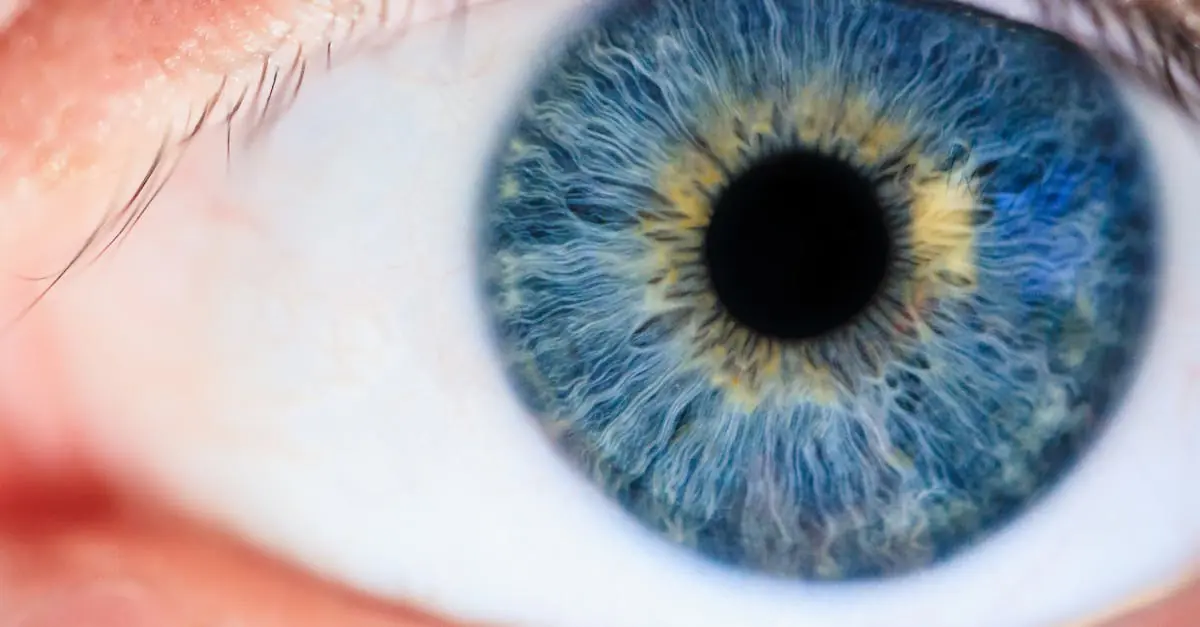Table of Contents
ToggleEyes are often called the windows to the soul, but they also deserve some serious TLC. After all, who wants to squint their way through life or miss out on the beauty of a sunset because their peepers are on the fritz? Keeping those orbs in tip-top shape is crucial, especially in a world where screens seem to multiply faster than rabbits.
Importance of Eye Health
Eye health plays a crucial role in overall well-being. Vision impairment directly affects daily activities and can reduce quality of life. Many individuals depend on their sight for work, leisure, and safety, highlighting the need for regular eye examinations.
Screen time contributes significantly to eye strain. Long hours spent in front of computers and phones can lead to conditions like digital eye strain and dry eyes. Implementing the 20-20-20 rule—looking at something 20 feet away for 20 seconds every 20 minutes—can alleviate discomfort.
Awareness of eye diseases is essential for prevention. Conditions such as glaucoma, cataracts, and macular degeneration can lead to vision loss. Early detection through comprehensive eye exams aids in managing these diseases effectively.
Nutrition impacts eye health. Consuming foods rich in vitamins A, C, and E, along with omega-3 fatty acids, supports vision and reduces the risk of eye disorders. Leafy greens, fish, and nuts contribute to optimal eye function.
Protection from UV rays is necessary. Wearing sunglasses with UV protection safeguards eyes from harmful rays that can lead to cataracts and retinal damage. Additionally, protective eyewear during activities like sports or home improvement projects provides extra security.
Hydration affects eye moisture. Drinking plenty of water helps maintain tear production, preventing dry eyes. Incorporating breaks and practicing the blink technique can also enhance comfort during prolonged screen usage.
Understanding the significance of eye health encourages proactive measures. Regular check-ups, a balanced diet, sun protection, and eye strain management ensure individuals maintain good vision throughout life. Prioritizing eye care leads to a fulfilling and vibrant experience in everyday life.
Common Eye Conditions
Awareness of common eye conditions enhances proactive management of vision health. Many individuals experience challenges related to these conditions as they age.
Cataracts
Cataracts occur when the eye’s natural lens becomes cloudy. This condition often leads to blurred vision and difficulty seeing at night. Age contributes significantly to the development of cataracts, with about 24.4 million Americans aged 40 and older affected. Treatment typically involves surgical options to replace the cloudy lens with a clear artificial one, restoring vision effectively.
Glaucoma
Glaucoma represents a group of eye conditions that damage the optic nerve, primarily caused by high intraocular pressure. Many people do not notice symptoms until significant damage has occurred, leading to irreversible vision loss. Approximately 3 million Americans suffer from glaucoma, making routine eye exams crucial for early detection and management. Treatment often includes prescription eye drops or surgical procedures to reduce eye pressure.
Age-Related Macular Degeneration
Age-related macular degeneration (AMD) affects the macula, the central part of the retina responsible for sharp vision. This condition typically manifests as blurred or diminished central vision, impacting daily tasks like reading and driving. AMD advances in two forms: dry AMD is more common, while wet AMD is less frequent but significantly more serious. In the U.S., roughly 2.1 million people experience some form of AMD, underscoring the importance of regular eye examinations and a diet rich in antioxidants for prevention and management.
Tips for Maintaining Eye Health
Maintaining eye health involves various proactive measures. Key practices include proper nutrition, regular eye exams, and effective management of screen time.
Nutrition and Diet
A diet rich in vitamins A, C, and E supports eye health. Leafy greens, carrots, and fish like salmon provide essential nutrients. Antioxidants play a role in reducing the risk of age-related disorders. Foods high in omega-3 fatty acids, such as walnuts and flaxseeds, contribute to better visual function. Hydration also matters; drinking plenty of water promotes moisture in the eyes. Consuming a balanced diet protects vision and supports longevity in eye health.
Regular Eye Exams
Regular eye exams are crucial for early detection of potential issues. The American Optometric Association recommends annual check-ups for those over age 40. Comprehensive eye exams identify conditions like glaucoma and cataracts before symptoms develop. Monitoring changes in vision helps maintain overall health and quality of life. Individuals with risk factors, like family history or high screen time, should schedule more frequent visits. Overall, proactive eye care minimizes the risk of vision impairment.
Screen Time Management
Managing screen time prevents digital eye strain. Implementing the 20-20-20 rule has proven effective; every 20 minutes, take a 20-second break to look at something 20 feet away. Reducing glare and using blue light filters can also alleviate discomfort. Maintaining proper distance from screens enhances visual ergonomics. Regular breaks from screens allow eyes to rest and recover. Staying aware of symptoms, such as dryness or fatigue, leads to better eye health overall.
Natural Remedies for Eye Health
Natural remedies can complement traditional care for maintaining eye health. Certain herbs and practices may support vision and reduce eye strain.
Herbs and Supplements
Herbs such as bilberry and ginkgo biloba promote improved circulation and support retinal health. Omega-3 fatty acids found in fish oil help reduce dry eye symptoms. Lutein and zeaxanthin, present in leafy greens, filter harmful blue light and enhance visual performance. Vitamin A, crucial for night vision, comes from sources like carrots and sweet potatoes. Antioxidant-rich berries contribute to overall eye health. Supplements may assist those with dietary restrictions or insufficient nutrient intake. Evaluating individual needs before adding new supplements is important.
Eye Exercises
Eye exercises strengthen the eye muscles and improve focus. Techniques like the 20-20-20 rule help alleviate digital eye strain. Staring at an object 20 feet away for 20 seconds every 20 minutes allows the eyes to relax. Palming, which involves covering the eyes with palms for a few moments, provides relief from tension. Focus shifts between near and distant objects can improve versatility. Practicing eye movements, such as rolling or looking side to side, enhances coordination. Consistently integrating these exercises into daily routines can support long-term eye health.
Maintaining eye health is essential for enjoying life to the fullest. By prioritizing regular eye exams and adopting healthy habits, individuals can significantly reduce the risk of vision problems. Simple practices like following the 20-20-20 rule and incorporating nutrient-rich foods into their diet can make a big difference.
Awareness of potential eye diseases and their early detection can lead to better management and outcomes. With the right approach to eye care, it’s possible to protect vision and enhance overall well-being. Embracing these proactive measures ensures that the beauty of the world remains clear and vibrant for years to come.




